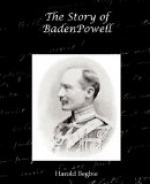When Baden-Powell turned his back on Charterhouse it was with the intention of proceeding to Oxford. Professor Jowett, who, by the bye, was the godfather of Baden, begged our hero to pay him a visit as soon as he left school, and when on this visit the Master heard that B.-P. could only spare two years for Oxford, he said, “Then Christ Church is the college for you, because at Balliol I like each man to remain three or four years, and go in for honours finally.” So Ste made plans for going to Christ Church, was examined, accepted for the following term, and Dean Liddell arranged about rooms for him in the House. But ere B.-P. went up, an Army examination came on, and, “just for fun,” up went our indefatigable hero with a light heart and no other thought in his mind than the determination to do his level best. The result of this happy-go-lucky entrance for examination was the unlooked-for success of our “unbruised youth with unstuffed brain,” who passed second out of seven hundred and eighteen candidates, among whom, by the way, were twenty-eight University candidates. As a reward for his brilliancy, B.-P. was informed by the Duke of Cambridge that his commission would be ante-dated two years.
Until this memorable event Baden-Powell had expressed no special predilection for soldiering. His chief desire had been to go in for some profession that would take him abroad and show him the world. The first service which seemed to attract him definitely at all was the Indian Woods and Forests, and this chiefly on account of a burning desire to roam about the gorgeous East. It was only when an elder brother suggested that, if he wanted to see India and other countries as well, he might be better suited in the Army, that this born soldier gave any indication of his desire for a military career. And only with the Army examination successfully conquered did he seriously begin to think of uniforms and swords and the glamour of a soldier’s life.
On the 11th September 1876 Baden-Powell joined the 13th Hussars in India, and one of his first acts was to take from his baggage an ocarina, and having assembled all the European children he could find in the station, to march at their head through the streets of Lucknow, playing with great feeling, which suffered, however, a little from his all-comprehensive grin, “The Girl I Left Behind Me.” In this manner he signalised his arrival, earning the undying love of every English mother in the place, and infusing into the gallant 13th Hussars (Viret in AEternum!) fresh vigour and fresh spirit.
The 13th Hussars, Sir Baker Russell’s old regiment, boasts a fine record, and the songs in the canteen at night will tell you how the regiment rode on the right of the line at Balaclava, when it was known to fame as the 13th Light Dragoons. One of these songs begins:—
Six hundred stalwart warriors,
of England’s pride the best,
Did grasp the lance and sabre
on Balaclava’s crest,
And with their trusty leader,
Lord Cardigan the brave,
Charged up to spike the Russian
guns—or find a soldier’s grave.




